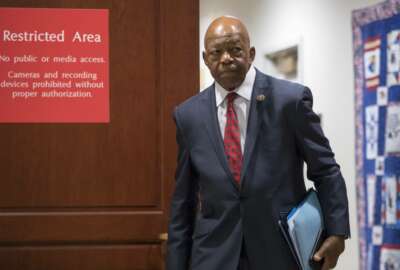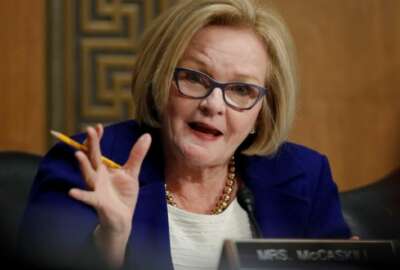
Don’t expect IGs to settle ‘political fights or policy battles’ following House leadership change
House Democrats anticipate a full slate of investigations and oversight actions once they gain the majority in January, but on at least one longstanding issue, the...
House Democrats anticipate a full slate of investigations and oversight actions once they gain the majority in January, but on at least one longstanding issue — the future of the FBI’s headquarters — the Justice Department’s inspector general has given no indication of whether his office will look into the matter.
“I’ll save my answer and responses to the congressional letters, and speak with them about their requests,” DoJ IG Michael Horowitz said Friday at the Project on Government Oversight’s summit in Washington.
But generally speaking, he added that agency construction and contracting issues do fall under the purview of the DOJ OIG. The watchdog office, for example, conducts routine audits of facilities run by the Bureau of Prisons.
Horowitz also serves as the chairman of the Council of Inspectors General on Integrity and Efficiency (CIGIE), which represents 73 federal IGs. Speaking from that broader perspective, he said lawmakers often call on agency watchdogs — often through open letters to the public — to settle politically charged disputes.
“I think from our standpoint as IGs, it’s somewhat good to be popular; but sometimes we’re a little too popular,” Horowitz said. “Many of the letters seek to have us try to resolve what are, in essence, political fights or policy battles, and to try and have IGs weigh in on as to who’s right and who’s wrong, and that’s clearly not our role.”
When doing that kind of oversight, IGs assess how programs are or aren’t working, as opposed to deciding whether they’re right or wrong programs.
“I think that’s a lane we very much try and stay out of,” Horowitz said.
In a recent interview, Rep. Gerry Connolly (D-Va.) told Federal News Network that he expects the House Oversight and Government Reform Committee to draw more scrutiny on everything from White House security clearances, to the future of the FBI headquarters, to the 2020 Census, and the Agriculture Department’s plans to relocate about 600 Washington metro-area employees.
Lawmakers’ requests for the DoJ OIG to begin an audit on the FBI headquarters decision touch on a variety of issues — including whether building a new facility on the site of the J. Edgar Hoover building is more cost-effective than a consolidated suburban campus in Maryland or Virginia, and what role President Donald Trump personally played the decision to keep the FBI in Washington.
In August, the General Services Administration’s Office of Inspector General released a report that focused the latter, but also determined that a new D.C. headquarters would cost more than a consolidated suburban campus, house fewer agency employees and would do little to address longstanding security concerns.
“As with many requests we get, they are complex and raise multiple issues, and sometimes we sort through them,” Horowitz said.
The DoJ OIG has walked a fine line on hot-button issues in the past, like in June, when it released a report on the agency’s handling of events leading up to the 2016 presidential election.
“We got a lot of different requests in looking to do a lot of different things, and we laid out what we were going to do, and we explained what we weren’t going to do,” Horowitz said.
“I think we would do the same in any kind of request like that, but certainly, questions that come up about how the Justice Department is spending their money or potentially spending their money and how they handled certain issues — construction-related issues, for example, we deal with at the [Bureau of Prisons],” he added.
‘Very strong working relationship’ with GAO
While IGs often take months to sort through the facts of an investigation or audit, Horowitz said Congress often takes a different approach.
“At every single hearing, the question I get from both sides — doesn’t matter which administration it was that was in power, who’s in charge — it’s how do we fix the problem. What can we do legislatively to fix the problem? They’re always talking about that and thinking that,” Horowitz said, “The question is, is there that follow-through?”
Horowitz, who estimates he’s testified about 40 times on the Hill, said congressional hearings often shine a light on IG reports as soon as they’re released, but added that lawmakers rarely revisit those issues.
“I always wonder what happens next, and on many occasions, everybody’s on to the next issue — whether it’s members of Congress or agency leadership, and that’s something I hope that folks step back and think about,” he said. “Not just ‘Let’s have a hearing and call it a day,’ but what do we learn at the hearing.”
The Government Accountability Office also plays a major role in agency oversight. The DoJ OIG holds quarterly meetings with GAO staff that handle DOJ-related issues to avoid oversight overlap.
“Obviously, many of the issues we’re asked to do, they’re asked to do, and we have a very strong working relationship,” Horowitz said.
At the CIGIE level, Horowitz said he and Allison Lerner, the Nation Science Foundation IG and CIGIE’s vice chair, regularly meet with GAO controller Gene Dodaro and senior agency leadership to talk about broader issues that cross-cut the IG community to make sure “we’re coordinated and not stepping on each other’s work, and not duplicating, most importantly, each other’s work.”
Even in cases where IGs agree to look into concerns raised by lawmakers, Horowitz said IGs and GAO value depth over speed.
“I think one of the things that can frustrate Congress, certainly when they’re dealing with IGs and I think to some extent perhaps GAO, is we’re not going to turn around and answer in a month. We’re not going to give the answer in two months, even. It’s going to take months for us to get the records, go through them, interview people. We’re going to issue a thorough report,” Horowitz said. “We can’t be seen as just responding to a political concern. We want to think about some of the bigger-picture issues that we’re looking — particularly if we see them as we’re starting and going into that review. So that can be a frustration for oversight committees, that we’re not [taking] a turn-it-around-immediately approach. It can be a frustration for agencies’ leadership and components’ leadership that we’re not in that mode of just turning things around quickly.”
Copyright © 2025 Federal News Network. All rights reserved. This website is not intended for users located within the European Economic Area.
Jory Heckman is a reporter at Federal News Network covering U.S. Postal Service, IRS, big data and technology issues.
Follow @jheckmanWFED
Related Stories





